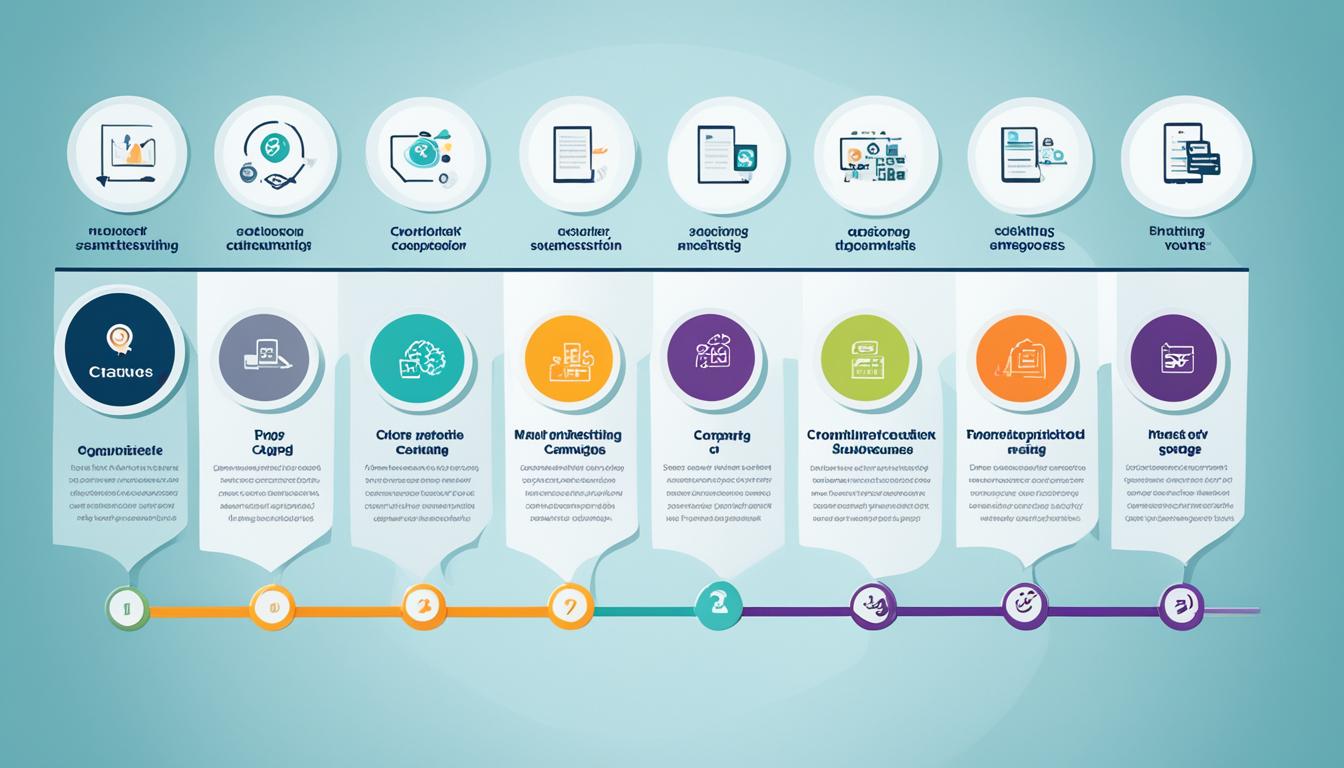Developing an effective B2B marketing strategy is crucial for startups to generate leads, increase brand awareness, and drive conversions. In today’s competitive business landscape, B2B startups need to adopt strategies that align with their unique needs and challenges. This comprehensive guide will provide valuable insights and tactics specifically tailored for B2B startups in 2024, helping them navigate the evolving marketing landscape and achieve sustainable growth.
Key Takeaways:
- Creating an effective B2B marketing strategy is essential for startups to generate leads, increase brand awareness, and drive conversions.
- By aligning marketing efforts with business goals and staying up-to-date with the latest trends, B2B startups can overcome the unique challenges they face.
- Understanding the differences between B2B and B2C marketing is crucial in developing a successful B2B marketing strategy.
- Personalizing the B2B marketing approach through targeted messaging, dynamic content, and user-generated content can significantly enhance engagement and conversion rates.
- Measuring performance through analytics and testing helps identify areas of improvement and optimize marketing efforts for better results.
Understanding B2B Marketing Strategy
A solid B2B marketing strategy is crucial for projecting the right brand image and making a favorable impression on prospects. In today’s competitive landscape, it’s essential to stand out and effectively communicate the value of your products or services to potential customers.
One successful approach to B2B marketing strategy is inbound marketing, which focuses on attracting prospects by providing valuable content. HubSpot, a leading marketing software company, is an excellent example of inbound marketing done right. Through their informative blog posts, e-books, and webinars, they attract and engage their target audience, positioning themselves as thought leaders in the industry.
Another effective strategy is community engagement, in which companies like Salesforce excel. By fostering brand loyalty and advocacy through knowledge sharing, Salesforce has created a community around their brand. This strategy not only enhances their brand’s reputation but also generates word-of-mouth referrals, further expanding their reach.
B2B marketing involves selling and promoting goods and services directly to other businesses. It requires a well-defined strategy to generate leads, increase traffic, and prove ROI. To achieve these goals, successful B2B marketing strategies often incorporate inbound marketing techniques, content marketing, and personalized outreach to prospects.
By understanding your target audience and their pain points, you can create content that addresses their specific needs. This targeted approach helps build trust and credibility, ultimately increasing the chances of converting prospects into customers. Through a strategic mix of inbound marketing and content marketing, B2B companies can position themselves as industry leaders and trusted partners.
Having a sound B2B marketing strategy enables companies to effectively communicate their value proposition, establish credibility, and differentiate themselves from competitors. By focusing on providing valuable content, engaging with prospects, and leveraging the power of inbound marketing and content marketing, B2B companies can make a lasting impression on their target audience and drive business growth.
Example: HubSpot’s Inbound Marketing Strategy
HubSpot’s inbound marketing strategy revolves around the creation and distribution of valuable and educational content. They provide resources such as blog posts, e-books, and webinars that address common pain points and challenges faced by their target audience.
Through their strategic content marketing efforts, HubSpot attracts prospects who are actively seeking solutions to their problems. By offering valuable insights and actionable tips, they establish themselves as trusted advisors in the industry. This positions HubSpot as the go-to resource for businesses looking to improve their marketing strategies and achieve better results.
This approach not only attracts new leads but also nurtures existing prospects through targeted email campaigns and personalized content recommendations. HubSpot’s inbound marketing strategy has proven to be highly effective in generating leads, building brand credibility, and driving conversions.
Differences Between B2B and B2C Marketing
In the world of marketing, there are distinct differences between B2B (Business-to-Business) and B2C (Business-to-Consumer) approaches. It is essential for marketers to understand these variations to develop successful strategies for each domain.
B2B Marketing:
In B2B marketing, the target audience comprises individuals or groups within organizations who are actively seeking solutions to specific challenges or pain points in their business operations. The primary focus is on providing products or services that cater to the specific needs of businesses and facilitate their growth and efficiency. B2B marketing often involves longer sales cycles due to the complexity of decision-making processes, as multiple stakeholders and decision-makers are involved in the purchasing process.
B2C Marketing:
In contrast, B2C marketing primarily targets individual consumers for personal use. It encompasses strategies and tactics that aim to entice individual customers, focusing on their immediate needs and desires. B2C marketing typically involves shorter sales cycles, as decisions are often made by a single individual or a small group of people.
Challenges:
Both B2B and B2C marketing face unique challenges. B2B marketers need to navigate through multiple decision-makers and stakeholders during the sales process, requiring a deep understanding of the organizational structure and effective relationship-building strategies. On the other hand, B2C marketers must keep up with rapidly changing consumer trends and preferences, ensuring their products or services are tailored to individual consumer expectations.
Sales Cycle:
The sales cycle is a crucial aspect that differentiates B2B and B2C marketing. In B2B marketing, the sales cycle tends to be more extended and complex, often involving multiple stages such as lead generation, nurturing, proposal development, negotiations, and contract finalization. Conversely, B2C marketing typically features shorter sales cycles, with immediate purchase decisions made by individual consumers based on their needs or desires.
To illustrate the contrasts further, here is a table outlining the key differences between B2B and B2C marketing:
| B2B Marketing | B2C Marketing |
|---|---|
| Targets organizations and businesses | Targets individual consumers |
| Focuses on providing solutions to business challenges | Focuses on meeting personal needs and desires |
| Involves longer and more complex sales cycles | Features shorter and more immediate sales cycles |
| Requires navigating through multiple decision-makers | Influenced by individual consumer preferences |
Understanding these fundamental differences between B2B and B2C marketing is vital for marketers to tailor their strategies effectively. By acknowledging the unique challenges and nuances associated with each domain, marketers can develop targeted campaigns that resonate with their target audience, leading to improved engagement, conversion rates, and overall marketing success.
Building a Personalized B2B Marketing Strategy
A personalized B2B marketing strategy is the key to effectively engage with your target market and drive business growth. To create a strategy that resonates with your audience, it is essential to take several important steps: understanding your target market, defining buyer personas, conducting thorough market research, analyzing competitors, and clarifying your unique value proposition.
Understanding Your Target Market
Before you can personalize your marketing strategy, you need a deep understanding of your target market. Identify the industries, sectors, and businesses that align with your products or services. Consider factors such as company size, location, revenue, and specific pain points or challenges they face. By focusing on your target market, you can tailor your messaging and approach to meet their specific needs and preferences.
Defining Buyer Personas
Creating buyer personas allows you to dive even deeper into understanding your target market on an individual level. Think of buyer personas as fictional representations of your ideal customers. These personas should include demographic information, job titles, responsibilities, motivations, pain points, and preferred communication channels. Developing accurate buyer personas helps you craft targeted marketing messages that resonate with your audience.
Conducting Thorough Market Research
Market research is essential for gaining insights into your target market and industry trends. It involves analyzing market size, growth potential, competition, and customer preferences. By collecting data through surveys, interviews, and industry reports, you can make informed decisions about how to position your products or services and effectively communicate their unique benefits.
Analyzing Competitors
Competitor analysis provides valuable insights into what other businesses in your industry are doing. Identify your main competitors and analyze their marketing strategies, target audience, unique selling propositions, and messaging. This analysis helps you identify gaps in the market and differentiate your business by offering something unique and valuable.
Clarifying Your Unique Value Proposition
Your value proposition is what sets your business apart from competitors and demonstrates the unique value you provide to your target market. Clearly define your value proposition by identifying the key benefits your products or services offer and how they solve your target market’s pain points. Your value proposition should be concise, compelling, and communicate the unique value you bring to your customers.
Once you have completed these steps, you can align your marketing messages with your target audience and distribute them through various online and offline platforms. By personalizing your strategy based on thorough market research, buyer personas, competitor analysis, and a well-crafted value proposition, you can enhance the effectiveness of your B2B marketing efforts.
Setting Goals and Measuring Performance
Setting clear goals and defining measurable metrics is crucial for evaluating the performance of a B2B marketing strategy. Collaborating with the sales team, setting specific and realistic goals, and using relevant key performance indicators (KPIs) provide a clear roadmap for success. Measuring performance helps identify areas for improvement and make data-driven decisions.
Collaboration with Sales Team
Effective collaboration between the marketing and sales teams is essential for setting aligned goals and measuring performance. By aligning marketing goals with sales objectives, both teams can work together towards a common goal and drive revenue growth. Regular communication and sharing of data between the teams enable a holistic view of the buyer’s journey, allowing for adjustments and optimizations throughout the marketing campaign.
Setting Specific and Realistic Goals
Setting specific and realistic goals is vital for tracking progress and evaluating the effectiveness of a B2B marketing strategy. Goals should be specific to the desired outcomes, such as lead generation, brand awareness, or conversion rate optimization. Realistic goals consider the available resources and the market conditions, ensuring they are attainable within the given timeframe. By setting clear goals, marketers can focus their efforts and measure success accurately.
Using Key Performance Indicators (KPIs)
Key performance indicators (KPIs) are essential metrics used to measure the success of a B2B marketing strategy. KPIs vary depending on the goals and objectives of each campaign but may include metrics such as:
- Lead conversion rate
- Website traffic
- Click-through rate (CTR)
- Customer acquisition cost (CAC)
- Return on investment (ROI)
By tracking these KPIs, marketers can assess the performance of their campaigns, identify areas for improvement, and make data-driven decisions for future strategies.
| KPI | Description |
|---|---|
| Lead Conversion Rate | The percentage of leads that convert into paying customers. This helps measure the effectiveness of the lead nurturing and conversion process. |
| Website Traffic | The number of visitors to a website. Increased website traffic indicates higher brand visibility and potential lead generation opportunities. |
| Click-through Rate (CTR) | The percentage of people who click on a specific link or call-to-action. CTR is a measure of engagement and the effectiveness of a marketing message. |
| Customer Acquisition Cost (CAC) | The cost incurred to acquire a new customer. Calculating CAC helps determine the financial efficiency of marketing campaigns and customer acquisition efforts. |
| Return on Investment (ROI) | The ratio of the net profit gained from an investment to the cost of the investment. ROI measures the financial success of marketing campaigns and their impact on revenue generation. |
By regularly monitoring and analyzing these KPIs, marketers can gain insights into the performance of their B2B marketing strategy and optimize their efforts to achieve better results.
Five Essential Strategies for B2B Marketing Plan
In order to create a successful B2B Marketing Plan, startups must focus on five essential strategies that drive results. These strategies include:
1. Define your Total Addressable Market (TAM)
Understanding your market and identifying your ideal customer profile is crucial for targeting the right audience. By defining your TAM, you can focus your efforts on the most relevant leads, increasing the chances of conversion and revenue growth.
2. Set clear goals
Having clear goals is essential to measure the success of your B2B marketing plan. Define specific and measurable objectives that align with your overall business objectives. This will help you stay focused and track your progress effectively.
3. Craft a compelling value proposition
Your value proposition is what sets you apart from your competitors. Clearly articulate the unique value you offer to your target audience. Highlight the benefits and outcomes your product or service provides, addressing their pain points and driving interest.
4. Strategize targeted outreach
Identify the most effective channels and tactics to reach your target audience. This may include email marketing, social media advertising, content marketing, or partnerships. Tailor your messaging and approach to resonate with your audience and optimize your reach.
5. Generate compelling content
Content is the foundation of every successful B2B marketing plan. Produce high-quality content that educates, informs, and engages your audience. This can be in the form of blog posts, videos, whitepapers, case studies, or webinars. Valuable content positions you as a thought leader and drives inbound leads.
By incorporating these five strategies into your B2B marketing plan, you can maximize your impact, attract the right leads, and ultimately drive business growth in 2024 and beyond.
| Strategy | Description |
|---|---|
| Define your Total Addressable Market (TAM) | Understand your market and target the most relevant leads |
| Set clear goals | Establish specific and measurable objectives for your marketing plan |
| Craft a compelling value proposition | Articulate the unique value you offer to your target audience |
| Strategize targeted outreach | Identify the most effective channels and tactics to reach your audience |
| Generate compelling content | Create high-quality content that educates and engages your audience |
Leveraging Emotion in B2B Advertising
Contrary to common misconceptions, B2B marketing should also leverage emotion. It’s essential to recognize that B2B buyers, just like B2C consumers, are influenced by emotional elements in their decision-making process. By incorporating storytelling into B2B advertising, companies can create a powerful emotional connection with their target audience.
Storytelling allows businesses to go beyond the features and benefits of their products or services and tap into the underlying emotions that drive decision-making in the B2B world. By crafting narratives that resonate with their audience’s pain points, challenges, and aspirations, companies can establish a genuine connection and build trust.
Emotional advertising in the B2B space can lead to increased conversions, customer loyalty, and brand affinity. When B2B buyers feel emotionally connected to a brand, they are more likely to become repeat customers and advocates, generating positive word-of-mouth and referrals.
Incorporating emotion into B2B advertising doesn’t mean abandoning facts and figures. The key is to strike a balance between rationality and emotion, using storytelling as a vehicle to convey both. By sharing real-life success stories, testimonials, and case studies, businesses can demonstrate the positive impact their solutions have had on other organizations, validating their credibility and building trust.
Benefits of Emotional Advertising in B2B
- Increased conversions: Emotional connections with B2B buyers can lead to higher conversion rates as they are more likely to be influenced by both the rational and emotional appeal of a product or service.
- Customer loyalty: By creating emotional bonds with their audience, businesses can foster long-term relationships, leading to repeat purchases and higher customer lifetime value.
- Brand affinity: Emotional advertising helps companies differentiate themselves from competitors and create a memorable brand identity that resonates with their target audience.
- Enhanced storytelling: Tapping into emotions allows businesses to tell compelling and authentic stories that captivate their audience, making their brand more relatable and human.
When implementing emotional advertising strategies in the B2B space, it’s essential to understand the specific needs, pain points, and aspirations of the target audience. Conducting in-depth market research and developing buyer personas can provide valuable insights into the emotions that drive decision-making in the B2B context.
By leveraging emotion in B2B advertising, companies can connect with their audience on a deeper level, stand out from the competition, and drive business growth. Crafting compelling narratives that address the emotional needs of B2B buyers can be a game-changer in building brand loyalty, increasing conversions, and fostering long-term relationships.
Personalizing B2B Marketing with Dynamic Content
Personalization is a key trend in B2B marketing, allowing startups to deliver tailored experiences to their target audience. One effective way to achieve personalization is through the use of dynamic content. By leveraging tools and technologies that enable dynamic customization based on user behavior, location, and intent, startups can create more engaging and specific experiences for their audience.
Dynamic content refers to the ability to change website content, emails, or ads in real-time based on individual user attributes or actions. This approach allows startups to deliver targeted messaging and personalized marketing that resonates with their audience, enhancing the user experience.
With dynamic content, startups can create customized landing pages that address the specific pain points or interests of different segments of their target market. By delivering relevant content that speaks directly to the needs and preferences of their audience, startups can increase engagement and improve conversion rates.
For example, imagine a software-as-a-service (SaaS) startup that offers different solutions for various industries, such as retail, healthcare, and manufacturing. By using dynamic content, they can tailor their website to display case studies, testimonials, and product features specific to each industry, providing a more personalized browsing experience for potential customers.
Another benefit of dynamic content is the ability to adapt messaging based on the user’s stage in the customer journey. Startups can create different variations of their website or emails to target prospects at different stages, such as awareness, consideration, or decision-making. By delivering the right message at the right time, startups can guide prospects through the sales funnel more effectively.
Benefits of Dynamic Content in B2B Marketing
Dynamic content offers several advantages for startups looking to personalize their B2B marketing efforts:
- Enhanced User Experience: By tailoring content to the specific needs and interests of individual users, startups can create a more relevant and engaging user experience.
- Improved Conversion Rates: Personalized marketing messages have been shown to result in higher conversion rates as they resonate with users on a more individual level.
- Targeted Messaging: Dynamic content allows startups to deliver targeted messaging that speaks directly to the pain points and challenges of their audience.
- Increased Engagement: By personalizing content based on user attributes and actions, startups can capture the attention and interest of their target audience more effectively.
- Efficient Marketing: With dynamic content, startups can automate the process of personalization, saving time and resources while still delivering a personalized experience.
In conclusion, personalization is a crucial aspect of B2B marketing, and dynamic content offers startups the ability to deliver customized experiences to their target audience. By leveraging tools and technologies that enable personalized marketing based on user behavior, startups can enhance the user experience, deliver targeted messaging, and improve conversion rates. Incorporating dynamic content into their B2B marketing strategy can help startups stay ahead of the competition and achieve their growth objectives.
Harnessing the Power of User-Generated Content and Case Studies
In the world of B2B marketing, credibility and brand loyalty are essential for success. One powerful way to build trust with your target audience is through the use of user-generated content and case studies. By sharing real-life experiences and success stories, you can showcase the value of your products or services and establish your brand as a trusted industry leader.
User-generated content, such as customer testimonials, reviews, and social media posts, allows your customers to become advocates for your brand. When potential clients see positive feedback and stories from real people, they are more likely to trust your business and consider your offerings.
Building Credibility with User-Generated Content
Encourage your customers to share their experiences with your brand by creating opportunities for them to provide feedback and reviews. Highlight these testimonials on your website and social media channels. This not only strengthens your credibility but also demonstrates to potential customers that others have had positive interactions with your brand.
Another effective strategy is to collaborate with customers to create case studies. Case studies provide in-depth insights into specific projects or use cases, showcasing the real-world impact of your products or services. These detailed success stories offer valuable proof of your capabilities and help build trust with potential clients.
Remember to include a variety of industries and company sizes in your case studies to demonstrate your ability to deliver results across different contexts. This will enhance your brand’s credibility by illustrating your adaptability and expertise.
| User-Generated Content | Case Studies |
|---|---|
| Builds credibility and trust | Provides detailed insights into successful projects |
| Creates brand advocates | Offers social proof and validation |
| Increases brand awareness | Illustrates your expertise and industry knowledge |
| Boosts brand loyalty | Helps potential clients envision the possibilities with your offerings |
By harnessing the power of user-generated content and case studies, you can enhance your B2B marketing strategy and establish a strong foundation of credibility and brand loyalty. Don’t underestimate the impact of showcasing real experiences and success stories – they can be transformative in driving conversions and building long-lasting relationships with your customers.
Importance of Analytics and Testing in B2B Marketing
Analytics and testing play a pivotal role in achieving success with B2B marketing strategies. By utilizing B2B Marketing Analytics, startups can gain valuable insights into the performance of their marketing campaigns. These analytics tools provide essential data that can be used to make data-driven decisions and optimize marketing efforts. Testing different strategies and analyzing the results allows startups to identify areas of improvement and maximize their return on investment (ROI).
Benefits of B2B Marketing Analytics
B2B Marketing Analytics provides startups with valuable insights and metrics that help evaluate and measure the effectiveness of their marketing efforts. By tracking key metrics such as conversion rates, customer engagement, and campaign performance, startups can make informed decisions to optimize their marketing strategy. The data obtained from analytics tools enables startups to identify trends, preferences, and behaviors of their target audience, allowing for personalized and targeted marketing campaigns.
Harnessing the Power of Testing
Testing different strategies is crucial for startups to determine the most effective marketing approaches. Conducting A/B tests, where two variations of a marketing campaign are compared, allows startups to analyze the impact of changes in messaging, design, or targeting. By testing different elements, startups can make data-driven decisions on what resonates best with their target audience, ultimately improving conversion rates and ROI.
Additionally, testing allows startups to validate assumptions, evaluate the performance of individual marketing channels, and uncover new opportunities for growth. It helps identify strengths and weaknesses in marketing campaigns and enables startups to iterate and optimize their strategies accordingly.
Making Data-Driven Decisions
Utilizing B2B Marketing Analytics and embracing testing facilitates the ability to make data-driven decisions. Startups can rely on data rather than gut feelings or assumptions when identifying the most effective marketing strategies. Data-driven decisions are based on concrete evidence and insights derived from analytics, allowing startups to allocate resources effectively, target the right audience, and optimize marketing efforts for maximum impact.
By combining B2B Marketing Analytics with testing, startups can continuously improve their marketing strategies, adapt to changing market dynamics, and stay ahead of the competition.
| Benefits of Analytics and Testing | Examples |
|---|---|
| 1. Improved Conversion Rates | Optimizing landing pages based on analytics data to increase conversion rates. |
| 2. Enhanced Targeting | Using analytics to identify the most effective marketing channels for reaching the target audience. |
| 3. Personalized Marketing | Utilizing analytics data to create targeted and personalized marketing campaigns. |
| 4. Optimization of Resources | Allocating marketing resources based on data-driven insights to maximize ROI. |
| 5. Continuous Improvement | Testing various strategies and iterating based on analytics data to improve overall marketing performance. |
Exploring B2B Influencer Marketing and Referral Systems
In today’s competitive B2B landscape, building brand credibility and generating leads are paramount for startups. Two strategies that have proven effective in achieving these goals are B2B influencer marketing and referral marketing. By collaborating with industry experts and leveraging the power of referrals from satisfied customers, startups can significantly enhance their brand exposure and lead generation efforts.
B2B influencer marketing involves partnering with influential individuals within the industry to promote products or services. These influencers, who have a large and engaged audience, can endorse a startup’s offerings, increasing brand recognition and credibility. By leveraging the expertise and reputation of these influencers, startups can increase their reach and connect with a targeted audience that is likely to be interested in their products or services.
Referral marketing is another powerful strategy for startups to generate leads and build brand credibility. Satisfied customers can be an invaluable source of referrals, as their positive experiences can influence others to engage with a particular brand. By implementing a robust referral program and providing incentives for customers to refer their network, startups can tap into the power of word-of-mouth marketing. This not only generates high-quality leads but also fosters a sense of trust and loyalty among existing customers.
Both B2B influencer marketing and referral marketing strategies rely on the principle of leveraging social proof to enhance brand credibility. When industry influencers or satisfied customers vouch for a startup’s products or services, it instills confidence in potential buyers and encourages them to engage with the brand. This increased credibility can have a significant impact on lead generation and ultimately contribute to the growth of the startup.
When implementing these strategies, startups should identify relevant influencers within their industry who align with their target audience and brand values. Building strong relationships with these influencers and developing collaborative content or campaigns can amplify the startup’s reach and enhance its credibility.
Similarly, startups should implement a robust referral program that incentivizes customers to refer their network. This can be in the form of discounts, rewards, or exclusive access to special offerings. Providing a seamless and user-friendly referral process can also encourage customers to actively participate in the program.
Overall, B2B influencer marketing and referral marketing are two strategies that can have a significant impact on a startup’s brand credibility and lead generation efforts. By leveraging industry influencers and harnessing the power of satisfied customers, startups can increase their brand exposure, attract high-quality leads, and drive business growth.
Conclusion
Developing and implementing a comprehensive B2B Startup Marketing Strategy is essential for the growth and success of startups in 2024. By understanding the target market, setting clear goals, and leveraging the latest trends, startups can create impactful marketing campaigns that drive lead generation, increase brand awareness, and ultimately lead to conversions.
To stay ahead of the competition, startups must align their marketing efforts with business goals and utilize data and analytics to make informed decisions. By continuously tracking key metrics and optimizing their strategies, startups can maximize their marketing ROI and achieve sustainable growth.
Implementing proven B2B Startup Marketing Strategies is the key to success in 2024. By understanding the target audience, delivering personalized experiences, leveraging dynamic content, and harnessing the power of user-generated content and case studies, startups can build credibility, establish brand loyalty, and generate quality leads.
By following these strategies and staying abreast of the latest marketing trends, startups can thrive in the competitive B2B landscape and achieve their growth objectives. The power of a well-executed B2B Startup Marketing Strategy cannot be overstated; it is the cornerstone of success in the dynamic and evolving business world.






